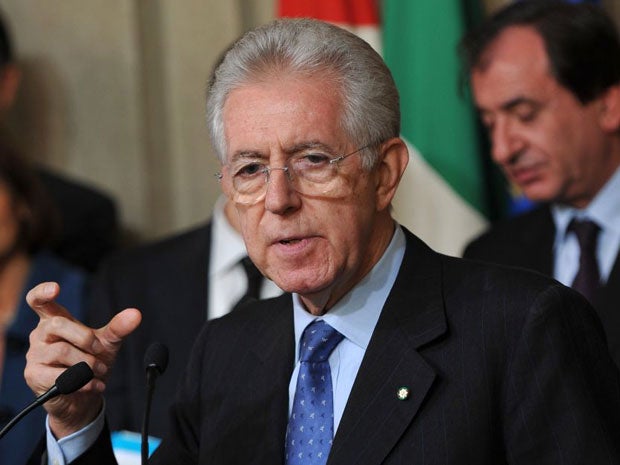
Your support helps us to tell the story
From reproductive rights to climate change to Big Tech, The Independent is on the ground when the story is developing. Whether it's investigating the financials of Elon Musk's pro-Trump PAC or producing our latest documentary, 'The A Word', which shines a light on the American women fighting for reproductive rights, we know how important it is to parse out the facts from the messaging.
At such a critical moment in US history, we need reporters on the ground. Your donation allows us to keep sending journalists to speak to both sides of the story.
The Independent is trusted by Americans across the entire political spectrum. And unlike many other quality news outlets, we choose not to lock Americans out of our reporting and analysis with paywalls. We believe quality journalism should be available to everyone, paid for by those who can afford it.
Your support makes all the difference.Italy will today embark on a controversial 18-month gamble to turn around its finances and rescue the euro by handing over control to an administration of entirely unelected technocrats with strong links to Brussels and international finance.
The parliament is expected to vote in the government of Prime Minister Mario Monti, a former EU competition commissioner, together with his cabinet, which, it was revealed yesterday, contains not a single elected politician.
After being asked to form a government by the President Giorgio Napolitano, following the collapse of Silvio Berlusconi's discredited administration, it was believed Mr Monti might recruit some established politicians.
When asked yesterday why his cabinet contained no parliamentary figures, Mr Monti said his talks with party leaders suggested "the non-presence of politicians in the government would help it". Paolo Ferrero, leader of the far-left Rifondazione Comunista party, said: "This government with ties to banks, to business, to the Vatican, to private universities – to the usual names – is the opposite of what this country needs."
But Roberto D'Alimonte, a political science professor at Rome's LUISS University, approved the cabinet line-up. "All these people are very high-calibre and highly respected," he said.
Much of the Italian public appeared to accept that exceptional measures were necessary, with the mainstream political parties tacitly admitting they would not be able to carry the required reforms through parliament. A poll by IPR Marketing showed that 53 per cent back the Monti administration. Many pundits were of the view that a Monti-led administration offered Italy its best chance of restoring confidence.
The European Central Bank intervened in the crisis yesterday by ramping up purchases of Italian bonds. But the markets remained unconvinced and after some initial respite the all-important yields on 10-year government bonds edged back near 7 per cent yesterday afternoon, suggesting growing concerns that the Monti government will default.
Meanwhile in Greece, a new coalition government won a confidence vote in parliament easily, backing a pledge by Prime Minister Lucas Papademos to speed up long-term reforms and secure a new bailout deal.
Join our commenting forum
Join thought-provoking conversations, follow other Independent readers and see their replies
Comments